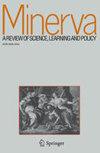Production of flour for human consumption from the reuse of organic waste
IF 3.2
2区 哲学
Q1 EDUCATION & EDUCATIONAL RESEARCH
引用次数: 0
Abstract
The present work aims to take advantage of residues from plantain and banana for the elaboration of flours that comply with the norms NTC-2799:1991 and NTE-INEN-616:2006. The experimental work involved preparing plantain and banana peels and then taking them to grinding and sifting. The results show good quality flour that meets the rigors of the Colombian Technical Standards. However, E. coli bacteria were observed in the developed flours, which should be considered to improve hygiene in the production process.利用有机废物生产供人类食用的面粉
本研究旨在利用车前草和香蕉的残留物制作符合 NTC-2799:1991 和 NTE-INEN-616:2006 标准的面粉。实验工作包括制备车前草和香蕉皮,然后进行研磨和筛分。结果显示,面粉质量良好,符合哥伦比亚技术标准的严格要求。不过,在研制的面粉中发现了大肠杆菌,应考虑改善生产过程中的卫生状况。
本文章由计算机程序翻译,如有差异,请以英文原文为准。
求助全文
约1分钟内获得全文
求助全文
来源期刊

Minerva
Multiple-
CiteScore
5.20
自引率
4.30%
发文量
26
期刊介绍:
Minerva is devoted to the study of ideas, traditions, cultures and institutions in science, higher education and research. It is concerned no less with history than with present practice, and with the local as well as the global. It speaks to the scholar, the teacher, the policy-maker and the administrator. It features articles, essay reviews and ''special'' issues on themes of topical importance. It represents no single school of thought, but welcomes diversity, within the rules of rational discourse. Its contributions are peer-reviewed. Its audience is world-wide.
 求助内容:
求助内容: 应助结果提醒方式:
应助结果提醒方式:


